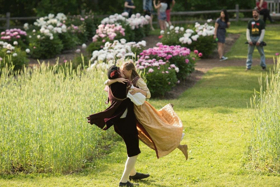University of Michigan's Shakespeare in the Arb presents ROMEO AND JULIET for First Time

Staging Shakespeare's iconic play proved to be a thorny decision, according to director Kate Mendeloff, a drama lecturer in the U-M Residential College. The Shakespeare in the Arb productions have historically been comedies. And while "Romeo and Juliet" begins as a romantic comedy, it takes a tragic turn.
"So many in our audience think of this play when they think 'Shakespeare,'" Mendeloff said. "I certainly do."
But the very popularity of the play, Mendeloff says, is one reason she hasn't felt comfortable about directing it in the Arb.
"Everyone knows it, and the speeches are so familiar, that it is intimidating to present another version, especially one without a balcony," she said.
Mendeloff says that when choosing each season's play, she's always considered the balance of scenes set in nature versus the need for an urban or interior environment. But years of directing Shakespeare have taught her that it's possible to set most of his plays outside.
"His theater was presented on essentially a bare stage, and the audience's imagination filled in the rest," she said. "In more modern adaptations, elements of realism and the stuff that supports it are useful but we don't choose to contemporize our productions."
The concept for this year's production was spurred by the current sociopolitical environment.
"The tragedy of the play is not with the youth, but with the older generation who have perpetrated the division between Montague and Capulet, so that it continues to poison the whole society," Mendeloff said.
In our particular political and social time, she adds, "doing a play where the ruling elite manipulate young people through division, and hate shows the tragic result of growing up in a system of violence, should resonate powerfully."
One aspect of "Romeo and Juliet" that Mendeloff says has generated a lot of questions is the balcony scene, which will have to be recreated in the Arb. The performance also features the play's famed sword fights, which are period-appropriate in style and double cast.
The cast and crew are eager to share the complexities and challenges of performing in and producing the play-all against the Arboretum backdrop. For Maria LoCicero, who plays Juliet, it's been exciting and fun "to see all the changes that happen in nature from April to June and to try to incorporate them in different ways."
The hardest thing about playing Romeo, says actor Cameron Flynn, is genuinely expressing the wide range of emotions he goes through and "engaging with the sometimes melodramatic text that Shakespeare gives us, all the while making sure that those emotions are felt genuinely by the audience and not experienced as comedic."
Shakespeare in the Arb began in 2001 when Mendeloff was asked to direct an outdoor production as part of a Ford Motor Co. grant for Arts in Nichols Arboretum. She chose Shakespeare's masterpiece "A Midsummer Night's Dream," a play about the transformation of people through nature, that, she says, is perfect for the Arb, with its natural setting, structure and language.
The production was such a success that Mendeloff remounted it the following summer, and since then Shakespeare in the Arb has become an Ann Arbor tradition and an enduring collaboration between Matthaei Botanical Gardens and Nichols Arboretum, U-M students and the Residential College.
"Romeo and Juliet" is directed by Mendeloff, along with longtime Shakespeare in the Arb actors Graham Atkin and Carol Gray, and performed by Residential College students and local actors. The al fresco production, which moves through parts of the Arb as the scenes change, draws thousands of Shakespeare fans each June to U-M's Nichols Arboretum.
INFORMATION: For ticket prices, parking and location info, visit Shakespeare in the Arb 2018: Romeo & Juliet.
Photo: The University of Michigan's "Shakespeare in the Arb" performances take place at Nichols Arboretum every June. Photo from "A Midsummer Night's Dream," taken June 4, 2015 by Scott Soderberg, Michigan Photography.
Comments

Videos


